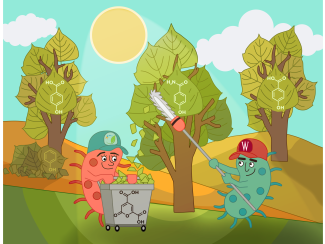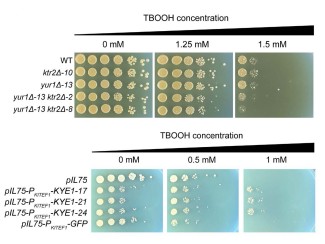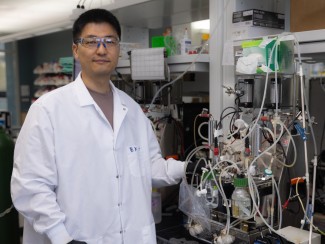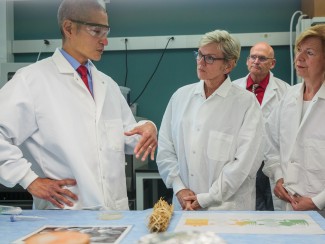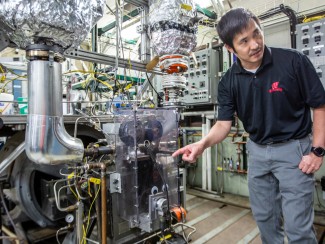
Our graduate students and postdoctoral researchers play an enormous role in the transition to a sustainable, resilient, and affordable energy future that is centered on social and economic equality. From lab experiments to field work to classrooms, these leaders of today and tomorrow are our catalysts for energy discovery.
In this new series, we learn more about what inspired these talented researchers, what brought them to their field of study, and the questions that drive their work at the Wisconsin Energy Institute.
This week we check-in with François Alberge, a postdoctoral research associate in Tim Donohue's lab at the University of Wisconsin–Madison.
Hometown: As a European postdoc, I would say that my home is across the Atlantic Ocean — but let’s say my foster home is here. I’m not sure I could have found a better place than Madison to welcome me in the U.S. When this postdoc ends, I plan to return to Europe.
What brought you to UW–Madison and to the Wisconsin Energy Institute?
During my PhD, my former institute invited Prof. Tim Donohue to give a talk. That was the first time I heard about the research done at WEI. I was very interested in the research done by his group on using the metabolism of bacteria to produce valuable compounds. Later, thanks to a partnership between my former university and UW–Madison, I was able to participate in the [Molecular Genetics of Bacteria and] Phages Meeting in Madison and could finally visit WEI in person. I knew it would be a perfect place for me to do a postdoc, and I am very thankful to have come work here.
What is one thing that has surprised you about UW, Madison or Wisconsin?
Madison is a great city to work and to live, with great nature conservation. The university is really the heart and the pride of the city, and this is something I hadn’t seen before and it’s fantastic to be a part of that. The only bad surprise was probably the winter, since I was used to sweet ones — but with warm clothes I can get past this downside!
Tell us about your research, in a way you would describe it to friends or family.
I am studying a bacteria called Rhodobacter sphaeroides, which is a photosynthetic organism, so similar to plants it can use the sun’s energy to produce organic matter. My research focuses on trying to understand the mechanisms and pathways behind that formation of matter and consequently to develop new bacterial strains that can produce that organic matter more efficiently.
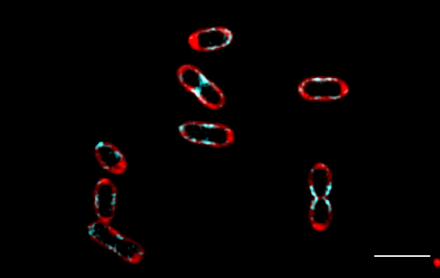
What is a practical use or application of your research outside of the lab?
The organic matter produced by Rhodobacter sphaeroides is mainly lipids, which forms the membranes of bacteria. The lipids produced by a bacteria like this can be used to produce biofuels, which are a sustainable and renewable way to help us face the big environmental challenges to come.
What led you to this area of research?
During my PhD, I worked on processes occurring inside the membranes of other bacteria, so it had many similarities to the research I’m doing now. I also liked the opportunity at WEI to work closely with Dan Noguera’s team, who have more of an engineering background than we do in our lab. It gives us another point of view on the industrial side.
What do you hope to accomplish during your time at WEI?
I know there will still be a lot of things to discover with these mechanisms even after the end of my postdoc — this is how science goes, you can never say you are done with a topic! But I think we have already learned a lot about how this bacteria produces lipids and bringing my stone to the building is great.
"The lipids produced by Rhodobacter sphaeroides can be used to produce biofuels, which is a sustainable and renewable way to help us face the big environmental challenges to come."
What is your favorite memory at WEI?
I already have so many good memories here at WEI, particularly at the GLBRC Annual Science Meetings, which unfortunately was done virtually this year. On a more personal side, I was also pleased to receive an outreach award from the GLBRC.
What’s something you’ve done or experienced that no one else you know has done?
This is a tough one, but if I limit myself to my family circle, I may be the first one to work in the U.S. as an academic researcher. They are proud, and I am too! I’m very lucky that they helped me to arrive here.
What do you like to do when you’re not at work?
In more favorable years, I liked to play soccer, but this year I’ve done a fair amount of biking. I also like a lot of science fiction, either in books or movies!

